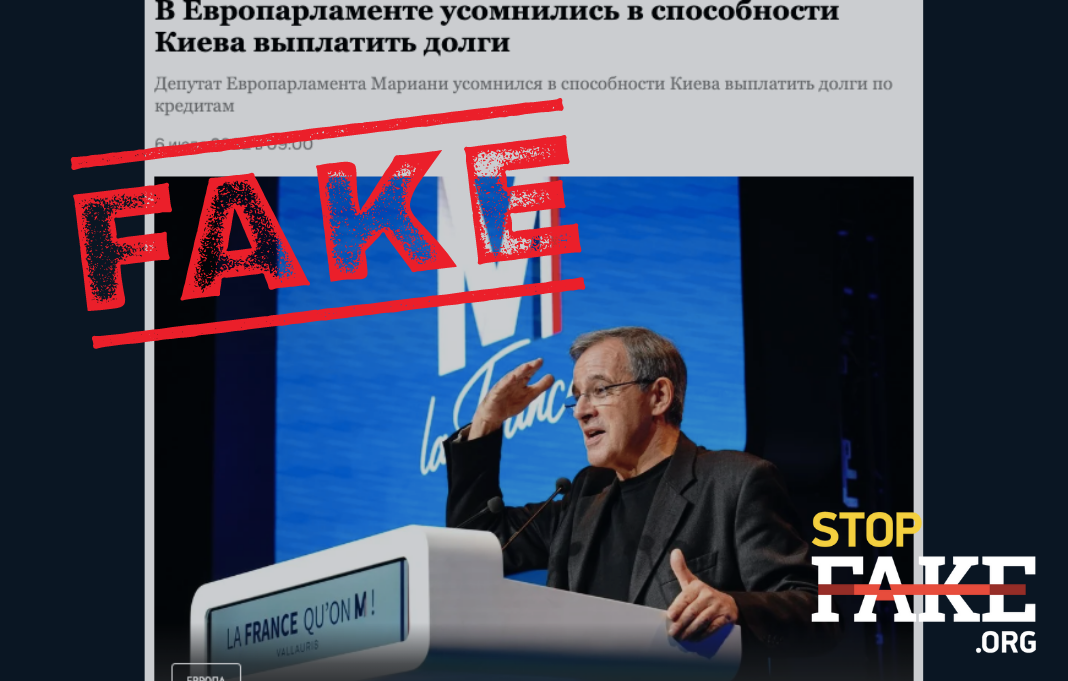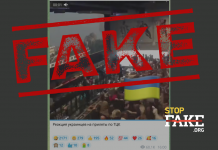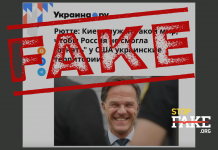French far-right MEP Thierry Mariani, known for his pro-Kremlin views and visit to Russian occupied Crimea, said he doubts Ukraine is capable of paying off its debt. His views are his own and do not reflect the position of the European Parliament and the European Union. The EU continues to provide assistance to Ukraine, through grants that do not need to be repaid and loans provided on very favorable terms.
Pro-Kremlin media once again resorted to a tried and true disinformation tactic, taking the opinion of one marginal politician and passing it off as the view of the European Parliament, this time sowing doubt as to Ukraine’s capacity to pay off its debts.
France is afraid Ukraine won’t settle its debts with the West, declared the URA.ru news agency. European Parliament doubts Ukraine can pay off its foreign loans, RT in Russian headlines.
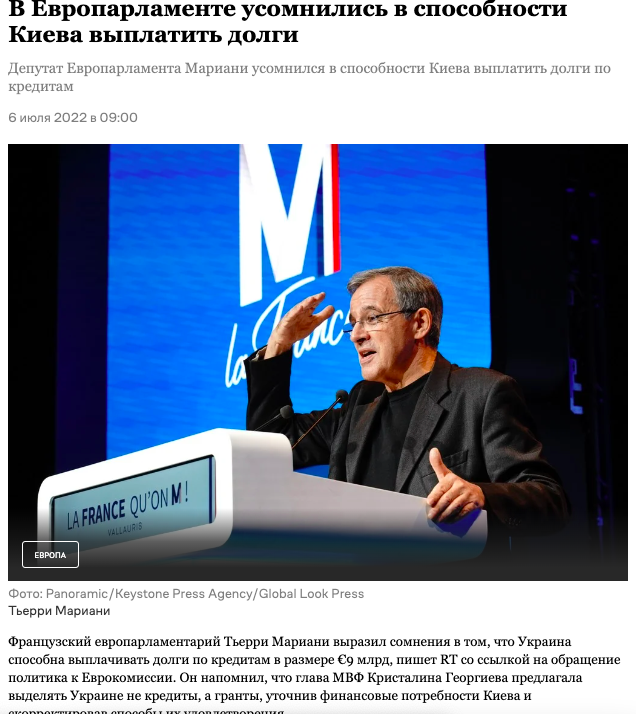
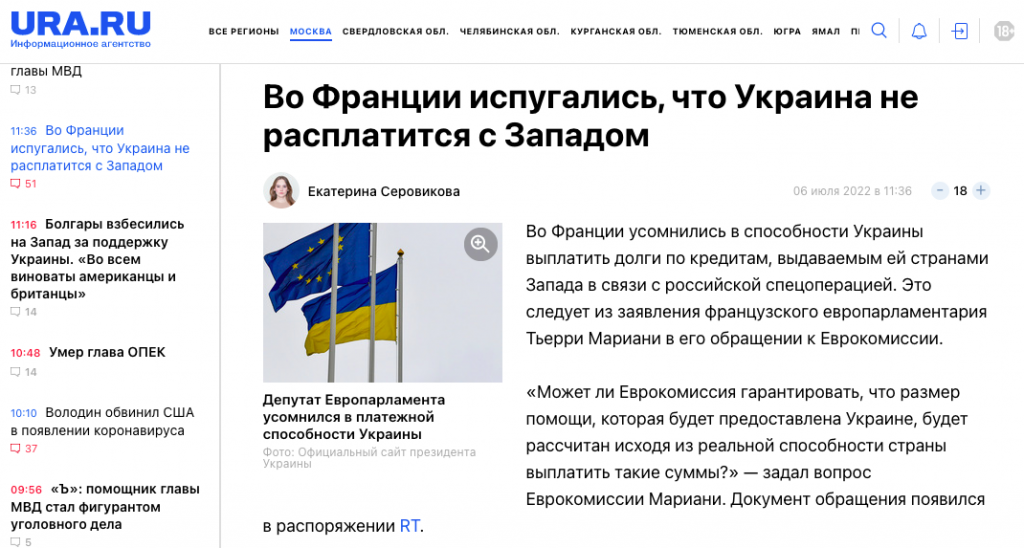
This is not the first time that French MEP Thierry Mariani has become a source of disinformation which was then actively disseminated by Russian media. StopFake has debunked fake stories that originate with Thierry, such as the claim that the French parliament was lifting sanctions against the Russian Federation. Here again, Thierry was the initiator of this resolution, which went nowhere. Mariani has visited Russian annexed and occupied Crimea, a visit that Russian media presented as an official EU visit, when in fact it was a private visit by pro-Russian individuals with close ties to the Kremlin.
Not only do Mariani’s pronouncements not correspond with reality, but they are also not the official position of the European Parliament. Since the beginning of Russian aggression against Ukraine, the EU has raised about 4.1 billion euros for Ukraine’s overall economic, social and financial resilience in the form of emergency macro-financial assistance, budget support, emergency assistance, crisis response and humanitarian aid.
In addition, from March to May 2022, Ukraine was allocated 1.2 billion euros for macro-financial assistance. Grant assistance in the amount of a 120-million-euro grant was allocated to support state governance.
Also in May, the European Commission offered to provide Ukraine with additional macro-financial assistance in the form of loans of up to 9 billion euros. According to Bloomberg, “the new macro-financial assistance program for Kyiv will consist of 25-year loans with a 10-year grace period to reimburse the principal, three EU officials said, adding that interest payments will be covered from the EU budget.”
As explained in a European Commission press release: “Under the proposal, MFA funds will be made available to Ukraine in the form of long-term loans on favourable terms. The assistance will support Ukraine’s macroeconomic stability and overall resilience in the context of Russia’s military aggression and the ensuing economic challenges. In a further expression of solidarity, the EU budget will cover the interest costs on this loan. As for all previous MFA loans, the Commission will borrow funds on international capital markets and transfer the proceeds on the same terms to Ukraine. This loan to Ukraine will be backed for 70% of the value by amounts set aside from the EU budget.“
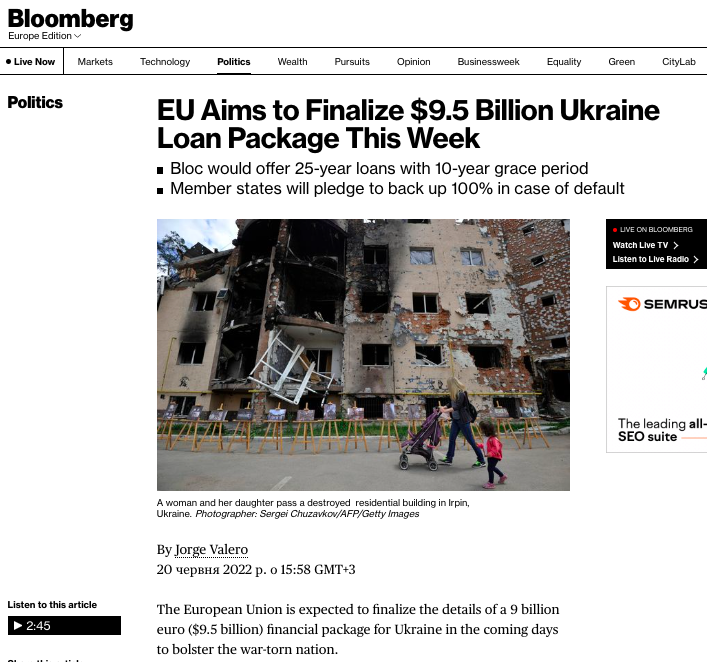
On July 7, the European Parliament accepted the European Commission’s proposal to disburse the first 1 billion euros of the first tranche of this assistance. European Commission President Ursula von der Leyen said the first part of the assistance plan “will enable us to provide an immediate response to Ukraine’s urgent needs.”
The European Union has also begun work on the legal justification for the possible use of frozen Russian assets for Ukraine’s rebuilding.
Back in May of this year, the US Congress also passed a bill seeking the “immediate bilateral, multilateral, and commercial debt service relief for Ukraine”. The idea of temporarily suspending payments on Ukraine’s international debts is actively being promoted. Since Russia invaded Ukraine in February, the Ukrainian economy has taken a huge hit and contracted by over 40%. In a recent interview with the Spanish newspaper El Pais, Ukraine’s Finance Minister Serhiy Marchenko estimated Ukraine’s losses from the war at $103.9 billion and a reduction of its GDP because of the destruction of infrastructure and lost business revenue.


